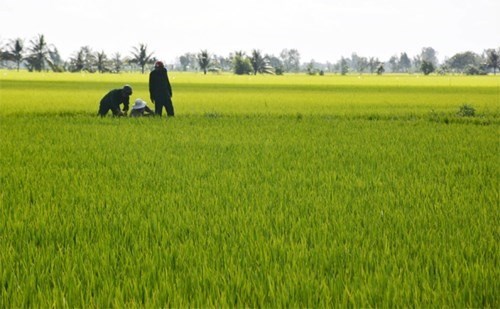While most pepper farmers in the province have suffered losses for the past two years because of the sharp decline in prices, more than 750 households growing pepper in Cam My district have earned profits by pooling their lands.
The Lam San Agriculture Cooperative in Lam San commune exports the spice to the EU.
Nguyen Van Quang, one of the members, said the cooperative guarantees purchase of the entire pepper output at VND 10,000 – 20,000 a kilogram higher than the market price.
    |
 |
|
A large-scale rice field in Dong Nai province’s Trang Bom district |
Thus, the households do not suffer losses though pepper prices have fallen, he said.
Under the large-scale field model, farmers with contiguous lands grow the same crop using the same techniques and schedules and are instructed by a company or, a cooperative (if they are members).
Nguyen Quy Tan, whose land has been part of a large-scale cacao field in Dinh Quan district’s Gia Canh commune for three years, said since joining he had not been worried about prices.
The Trong Duc Cacao Products Limited Company, which helped establish the large-scale field, pays him VND 1,000 – 2,000 higher than market prices per kilo, he said.
In the past cacao prices had been volatile and sometimes fell by VND 2,000 a kilogram, he said.
If the company had not overseen the setting up of the large-scale field, he would cut down his cacao trees to plant other crops, he said. “After I tied up with the company, I feel secure.”
Huynh Thanh Vinh, Director of the provincial Department of Agriculture and Rural Development, said the establishment of large-scale fields and cooperatives to grow clean crops yielded positive results. However, their number in the province was not large, he said.
He attributed this to farmers and companies not achieving benefits, the lack of markets, insufficient support from the authorities, and the small size and scattered nature of farm lands.
Dong Nai has 18 large-scale fields with a total area of nearly 6,000ha pooled by around 5,000 participating households, according to the Department of Agriculture and Rural Development. The area accounts for 2 percent of the province’s arable lands.
To ensure sustainable development of agriculture, the province has called on farmers and companies to strengthen their cooperation and simplified access to preferential credit and land policies.
It will also co-operate with other agencies to provide farmers, cooperatives and companies with market information, especially about key local agricultural produce.
"When authorities do a good job of forecasting the market, companies and co-operatives know precisely about the market’s demand and strengthen collaboration with farmers to set up large-scale fields to grow the crops that are in demand," Vinh said.
The province plans to help managers of co-operatives acquire management skills and participate in trade promotion activities in the country and abroad.
Source: VNA